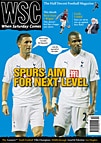 Villa and Ipswich battle it out for the title. By Josh Widdicombe
Villa and Ipswich battle it out for the title. By Josh Widdicombe
The long-term significance
The new decade brought the first signs of a new England team. West Brom captain Bryan Robson made his international debut, becoming Captain Marvel for club and country for a decade before taking to management like a duck to oil. Terry Butcher also established himself at the centre of the England defence, becoming the youngest England player at Spain 1982. Gary Lineker made his first appearance in the top flight for Leicester, often playing out wide, while Chris Waddle, Peter Beardsley and Mark Wright were also starting out. After this campaign the rule of three points for a win was introduced, replacing the system that had operated since the Football League’s formation in 1888-89.
Story of the season
Ron Saunders brought Aston Villa their first title in 71 years. Having sold Andy Gray to Wolves at the start of the season and with only two internationals in the team (Jimmy Rimmer and Des Bremner had one cap each for England and Scotland), Villa were a surprise success and Saunders spent the season griping at the “London mafia” for ignoring them in favour of more glamorous sides. Villa pushed Liverpool out of the title race by beating them 2-0 at Villa Park in January, following it with a run of six more victories. But Ipswich topped the table at the beginning of April before losing seven of their last ten games.
Bobby Robson’s side, who at the start of April were on for a treble, made up for the disappointment in part with a 5-4 aggregate victory in the final of the UEFA Cup against AZ Alkmaar, PFA Player of the Year John Wark scoring in both legs. Liverpool made it an English European double by beating Real Madrid 1-0 in the European Cup final thanks to a rare Alan Kennedy goal.
Tottenham won the FA Cup in a replay against Man City and set pop music history by rhyming Wembley and trembly in their cup final song Ossie’s Dream.
Crystal Palace had an appalling season that started with nine defeats in ten games, saw four different managers pass through the door and, worst of all, ended with Ron Noades in control. Joining them in Division Two were Leicester and Norwich, after Brighton won their last four matches.
For the record books
Saunders used a paltry 14 players all season, a record for a League-winning team (and one that won’t be broken any time soon). Spurs’ FA Cup victory further fed the dubious myth that they always win trophies in years ending in a one. Sadly for trivia fans, they failed to win anything in 2001. Liverpool’s 2-1 defeat at home to Leicester in January ended a run of 63 home league games without defeat, stretching back to February 1978. But their European Cup was the fifth English victory in the competition in a row. Villa would make it a record six the following season.
Same place today
Ten of the teams are in the Premier League today. Of these, five have stuck around in the top division throughout the intervening years. Middlesbrough, Manchester City, Birmingham and Sunderland have fought for the title of yo-yo club, sharing 16 relegations from the top flight since 1981 and all spending time in the third tier, too.
Moved furthest away
Brighton, Nottingham Forest and Leeds find themselves the furthest adrift, in League One. All have been through various states of financial hardship on their way down and Brighton look to be the only one of the three to be on a steady footing.
Went on to greater things
Lee Chapman ~ The 20-year-old striker was Stoke’s top scorer in his first full season. Went on via Arsenal, Niort and others to Leeds, where he was top scorer in the side that won the League in 1991-92.
Nigel Spink ~ Villa’s reserve keeper didn’t add this season to a first appearance made at Christmas 1979, but played a starring role in the 1982 European Cup final win, replacing Jimmy Rimmer early on. Spink went on to play more than 350 games for Villa.
Kevin Ratcliffe ~ Began his Everton career as a full-back before switching to central defence. He went on to captain the team to league and cup success.
Disappearing from view
Ray Kennedy ~ Topped his final full season at Liverpool with a third European Cup win. After moving to Swansea, he was diagnosed with Parkinson’s at the age of 35 and now raises money for research into the disease.
Garry Birtles ~ A goalscoring legend at Forest where he won two European Cups, Birtles moved to Man Utd for £1.25m in October but didn’t score for them until September 1981.
Ron Saunders ~ Left Villa after a contractual dispute midway through the following season. After unsuccessful spells at Birmingham and West Brom, he retired from management in 1986.
From WSC 248 October 2007